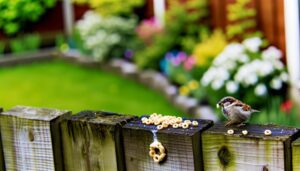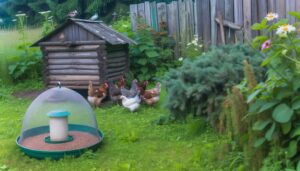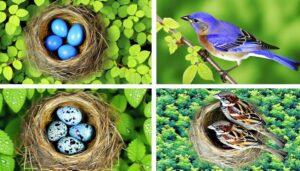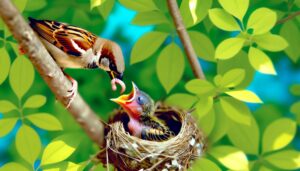You Feed Fledgling Sparrows Mealworms: A Care Guide
Feeding a fledgling sparrow mealworms is indeed beneficial given their high protein and fat content, which supports muscle development and energy needs. Live mealworms are preferable to provide hydration and ease digestion due to their soft exoskeletons.
However, it's important to gut-load mealworms with nutrient-rich foods to maximize their nutritional value. Be cautious of potential risks such as nutritional imbalances, pathogen transmission, and choking hazards.
High-quality mealworms and proper preparation can mitigate these risks. Additionally, monitoring the fledgling's health for any signs of nutritional deficiency or poor feather growth is advised.
For a detailed approach to caring for fledgling sparrows, more nuanced strategies are essential.
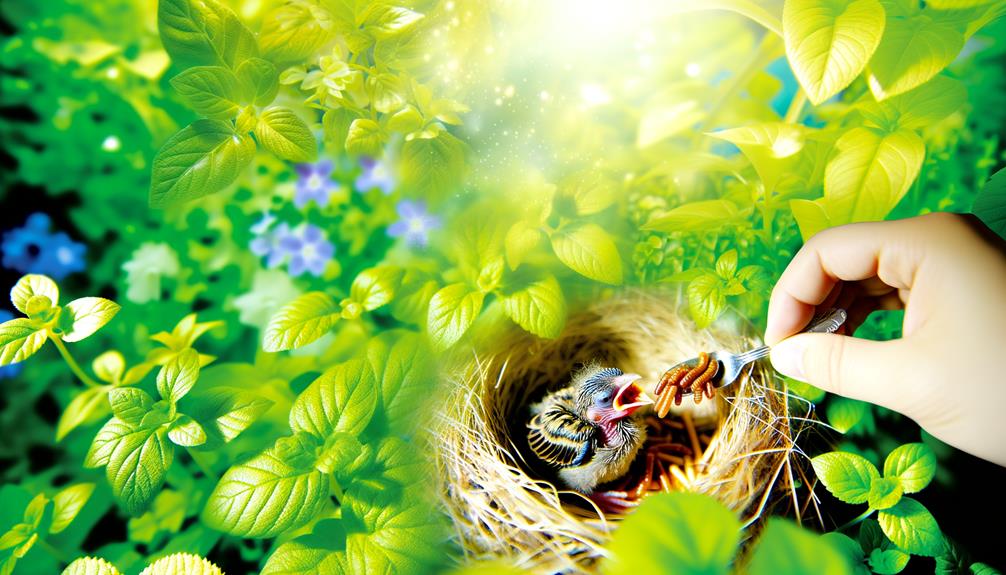
Key Takeaways
- Yes, fledgling sparrows can be fed mealworms as they provide essential proteins and fats.
- Live mealworms are preferred for hydration purposes.
- Gut-load mealworms with nutrients for enhanced benefits.
- Use sanitized feeding tools to prevent pathogen transmission.
- Monitor for nutritional balance to avoid deficiencies.
Nutritional Needs of Fledgling Sparrows
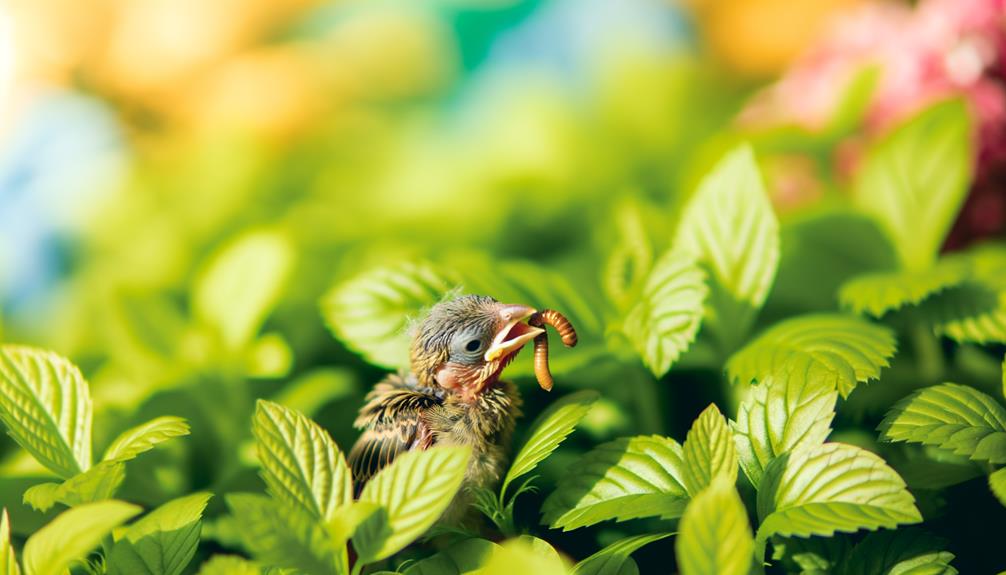
Understanding the nutritional needs of fledgling sparrows is essential for ensuring their best growth and development during this vulnerable stage of life. Fledgling sparrows require a diet rich in proteins, fats, vitamins, and minerals to support rapid growth and feather development.
Proteins are essential for muscle building and overall development, while fats provide the necessary energy for high metabolic rates. Key vitamins, such as A and D, and minerals like calcium and phosphorus, are crucial for robust bone formation and immune function. Additionally, hydration through water intake is necessary to prevent dehydration.
An ideal diet must be meticulously balanced to mirror the natural insect and seed-based diet that sparrow parents typically provide, ensuring fledglings achieve healthy maturation.
Benefits of Mealworms for Birds
Mealworms serve as an exceptional nutrient-rich food source, providing essential proteins, fats, and vitamins necessary for the growth and development of fledgling sparrows.
Their soft exoskeletons make them easy to digest, thereby facilitating efficient nutrient absorption in young birds.
Additionally, the balanced nutrient profile of mealworms supports overall health and accelerates recovery from developmental stresses.
Nutrient-Rich Food Source
As a highly nutritious food source, mealworms provide necessary proteins, fats, and important micronutrients that are required for the growth and development of fledgling sparrows.
The protein content in mealworms, approximately 50%, supports muscle development and tissue repair.
Fats, constituting about 30%, offer high-energy sustenance vital for the metabolic demands of young birds.
Additionally, mealworms are rich in essential micronutrients such as potassium, zinc, and essential amino acids, which contribute to overall physiological health and feather development.
The inclusion of mealworms in a fledgling sparrow's diet guarantees a balanced intake of nutrients, promoting robust health and enhancing survival rates.
This nutritional profile makes mealworms an ideal supplement to the dietary needs of young, growing birds.
Easy to Digest
Due to their soft exoskeleton and high moisture content, mealworms are highly digestible for fledgling sparrows, ensuring efficient nutrient absorption and minimal digestive stress.
The reduced chitin content in young mealworms simplifies the digestive process, making it easier for the fledglings' developing gastrointestinal systems to break down food and assimilate essential nutrients.
Additionally, the moisture in mealworms helps maintain hydration levels, which is vital for the growth and overall health of young birds.
The high bioavailability of proteins and fats in mealworms further supports rapid growth and energy metabolism.
Consequently, feeding mealworms to fledgling sparrows not only meets their dietary requirements but also promotes a smoother digestion process, aiding in their swift development into healthy adult birds.
Risks of Feeding Mealworms
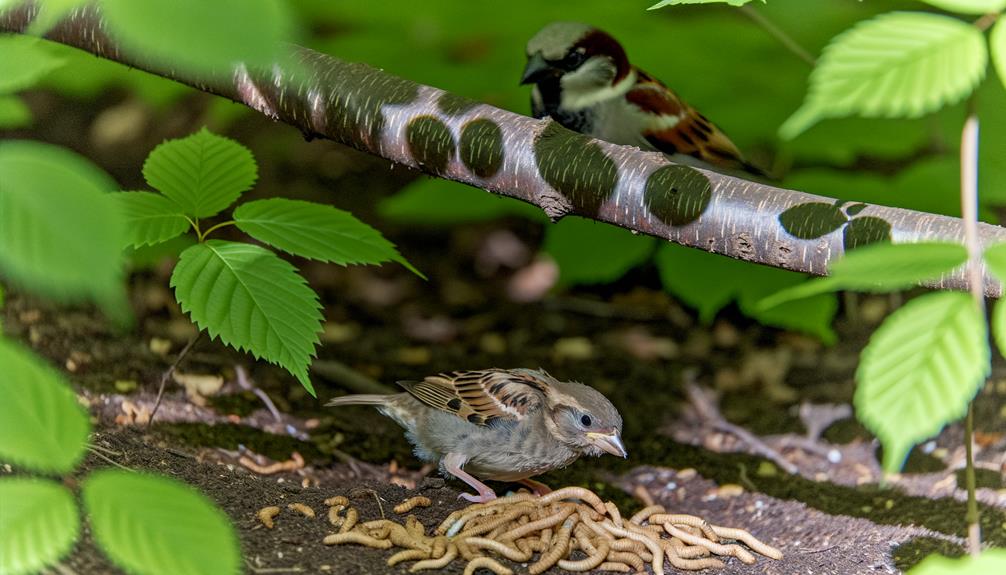
Feeding fledgling sparrows mealworms can pose several risks, including potential nutritional imbalances and the presence of harmful pathogens. Mealworms, while high in protein, may lack other essential nutrients necessary for the best growth of young birds.
The following are key risks associated with feeding mealworms to fledgling sparrows:
- Nutritional Imbalance: Reliance on mealworms can lead to deficiencies in vitamins and minerals, essential for the development of bones and feathers.
- Pathogen Transmission: Mealworms may carry bacteria or parasites, such as Salmonella or nematodes, which can infect and harm fledgling sparrows.
- Choking Hazard: Improperly sized or inadequately prepared mealworms can present a choking risk, particularly for very young or inexperienced birds.
Careful consideration and moderation are essential when incorporating mealworms into a fledgling's diet.
Types of Mealworms
When considering mealworms as a dietary supplement for fledgling sparrows, it is important to differentiate between live and dried mealworms. Live mealworms provide higher moisture content, beneficial for hydration. Dried mealworms, on the other hand, are more convenient but may require supplementation due to their lower water content.
Additionally, sourcing high-quality mealworms is necessary to guarantee they are free from harmful pesticides and pathogens, safeguarding the health of the young birds.
Live Vs. Dried Mealworms
Evaluating the nutritional profiles and practical implications of live versus dried mealworms is important for understanding their suitability in the diet of a fledgling sparrow. Both forms offer unique benefits and considerations:
- Hydration:
Live mealworms provide moisture, which is essential for fledglings that may not be adept at drinking water independently. Dried mealworms lack this hydration, necessitating supplementary water sources.
- Storage and Shelf Life:
Dried mealworms are easier to store, with a longer shelf life, making them a convenient option. Live mealworms require specific conditions to remain viable, adding to the complexity of their use.
- Palatability and Stimulation:
Live mealworms may be more appealing to fledglings due to their movement, stimulating natural hunting and feeding behaviors that are important for their development.
Nutritional Value Differences
Understanding the nutritional value differences between various types of mealworms is critical to optimizing the diet of a fledgling sparrow. Live mealworms typically contain higher moisture content, providing essential hydration alongside protein, fat, and fiber.
In contrast, dried mealworms, though convenient and long-lasting, have reduced water content, concentrating their protein and fat levels. Nutritional composition also varies with the mealworm's developmental stage; larvae are rich in protein and fat, whereas pupae and adult beetles offer differing nutrient profiles.
Moreover, gut-loaded mealworms, which have consumed nutrient-rich diets, provide enhanced vitamins and minerals. Analyzing these nutritional variations enables precise dietary planning, ensuring fledgling sparrows receive balanced nourishment essential for their growth and development.
Sourcing Quality Mealworms
To guarantee fledgling sparrows receive the best nutrition, sourcing high-quality mealworms involves considering factors such as species, developmental stage, and the conditions in which they were raised.
The nutritional content and safety of mealworms can vary significantly based on these variables. Three key considerations are:
- Species: Different species, such as Tenebrio molitor and Zophobas morio, offer varying nutritional profiles. Tenebrio molitor is generally preferred for its balanced protein and fat content.
- Developmental Stage: Mealworms in the larval stage provide excellent nutrition. Overgrown or pupated mealworms may have altered nutrient availability.
- Rearing Conditions: Mealworms raised in controlled, hygienic environments are less likely to carry harmful pathogens or pesticides, ensuring safer consumption for fledgling sparrows.
Preparing Mealworms for Fledglings
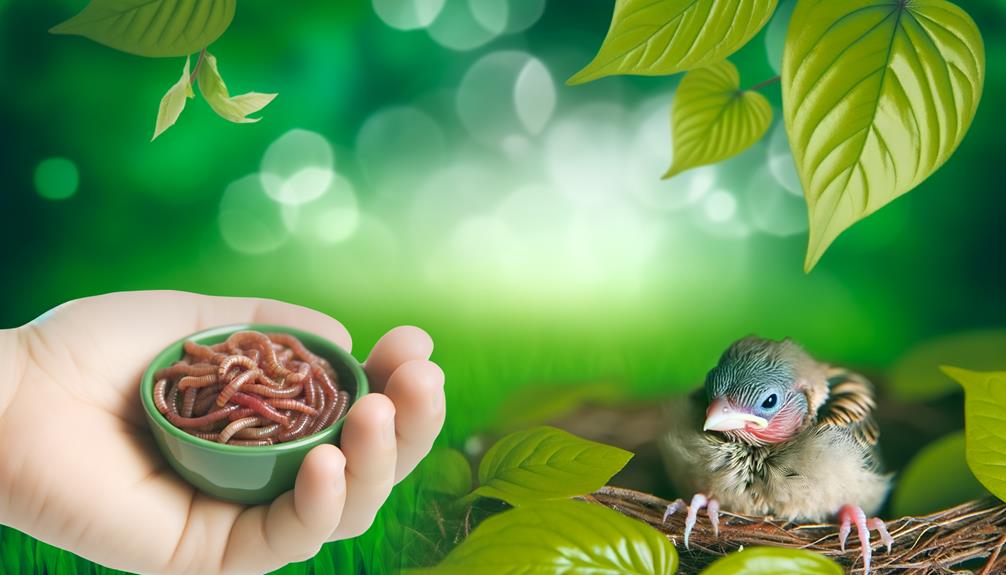
Before offering mealworms to fledgling sparrows, it is important to make sure they are properly prepared to maximize nutritional benefits and prevent potential health risks.
Start by ensuring the mealworms are gut-loaded with nutrient-rich foods such as fruits, vegetables, and specialized insect chow for at least 24 hours prior to feeding. This process enhances their nutritional profile, making them a more balanced diet for the fledglings.
Additionally, mealworms should be lightly dusted with a calcium supplement to support bone development, as insects alone may not provide sufficient calcium.
How to Feed Mealworms Safely
When feeding mealworms to fledgling sparrows, it is important to make sure that the feeding environment is clean and controlled to reduce the risk of contamination and disease transmission.
To achieve this, follow these guidelines:
- Sanitize Feeding Tools: Use sterilized feeding tweezers or forceps to handle mealworms, ensuring that no pathogens are introduced during feeding.
- Control Mealworm Quality: Source mealworms from reputable suppliers, and inspect them for signs of illness or parasites that could harm the fledgling.
- Monitor and Clean Feeding Area: Regularly clean and disinfect the feeding area to prevent the buildup of harmful bacteria and fungi, which can thrive in organic residues.
Alternative Food Options
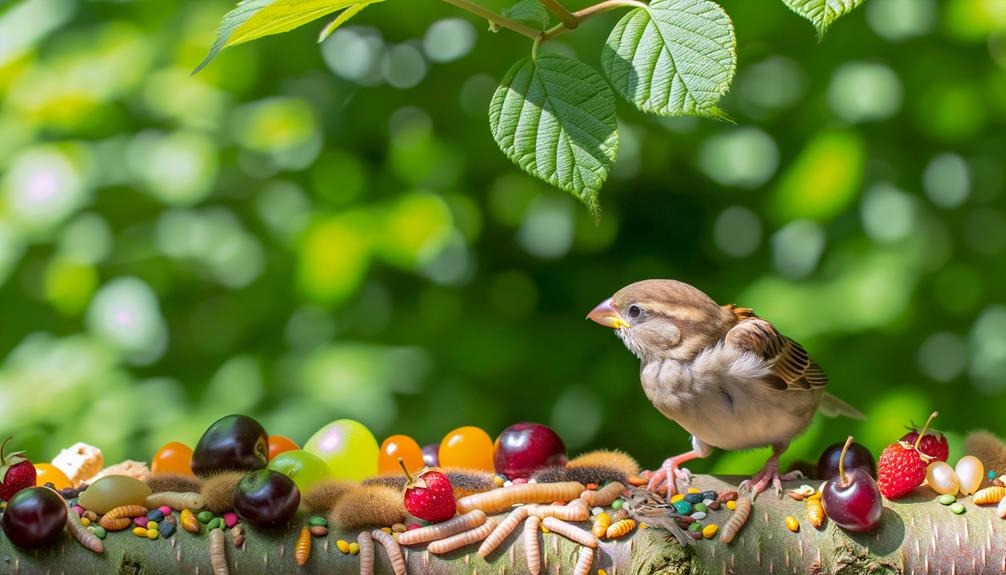
In addition to mealworms, fledgling sparrows can benefit from a variety of alternative food options that provide balanced nutrition and support healthy development. These options include various insects, fruits, and seeds, each contributing essential vitamins, minerals, and proteins necessary for growth. For instance, finely chopped boiled eggs offer a rich source of protein and calcium, while soft fruits like berries supply crucial antioxidants and vitamins. Small seeds, such as millet, provide necessary carbohydrates and fats.
| Food Type | Nutritional Benefits |
|---|---|
| Boiled Eggs | High in protein and calcium |
| Soft Fruits | Rich in antioxidants and vitamins |
| Small Seeds | Provide carbohydrates and healthy fats |
These diverse food sources guarantee fledgling sparrows receive complete nourishment for robust development.
Signs of Nutritional Deficiency
Nutritional deficiencies in fledgling sparrows can manifest through various physiological symptoms, most importantly weakness and lethargy, which indicate insufficient caloric or nutrient intake.
Additionally, poor feather growth may signal a lack of essential vitamins and minerals, necessary for proper development and overall health.
Monitoring these signs is essential for ensuring the fledgling receives a balanced diet conducive to best growth.
Weakness and Lethargy
Weakness and lethargy in fledgling sparrows often indicate underlying nutritional deficiencies, which can manifest due to inadequate intake of essential nutrients such as proteins, vitamins, and minerals. These deficiencies can severely impact the bird's development and overall health. To address and prevent such issues, it is important to maintain a balanced diet.
Common signs of nutritional deficiency include:
- Reduced Activity Levels: A noticeable decrease in the bird's energy and movement, often accompanied by prolonged periods of inactivity.
- Muscle Atrophy: Significant loss of muscle mass, making the bird appear frail and weak, hindering its ability to fly or perch.
- Lethargy: Unusual sleepiness and a marked lack of responsiveness to stimuli, suggesting severe energy depletion.
Addressing these symptoms promptly is crucial for the fledgling's survival and growth.
Poor Feather Growth
Poor feather growth in fledgling sparrows can be a clear indicator of underlying nutritional deficiencies, particularly those involving inadequate levels of proteins, vitamins, and trace minerals essential for feather development.
Proteins, comprising amino acids like methionine and cysteine, are vital for keratin synthesis, the primary constituent of feathers. Deficiencies in vitamins such as A, D3, and biotin can impair cellular function and protein utilization, leading to poor feather quality and growth.
Trace minerals like zinc and copper are essential for enzymatic processes that facilitate feather maturation. Mealworms, while rich in protein, may lack the detailed nutrient profile necessary for best feather health.
Hence, a balanced diet incorporating a variety of nutrients is crucial for fostering robust feather development in fledgling sparrows.
Monitoring Sparrow Health
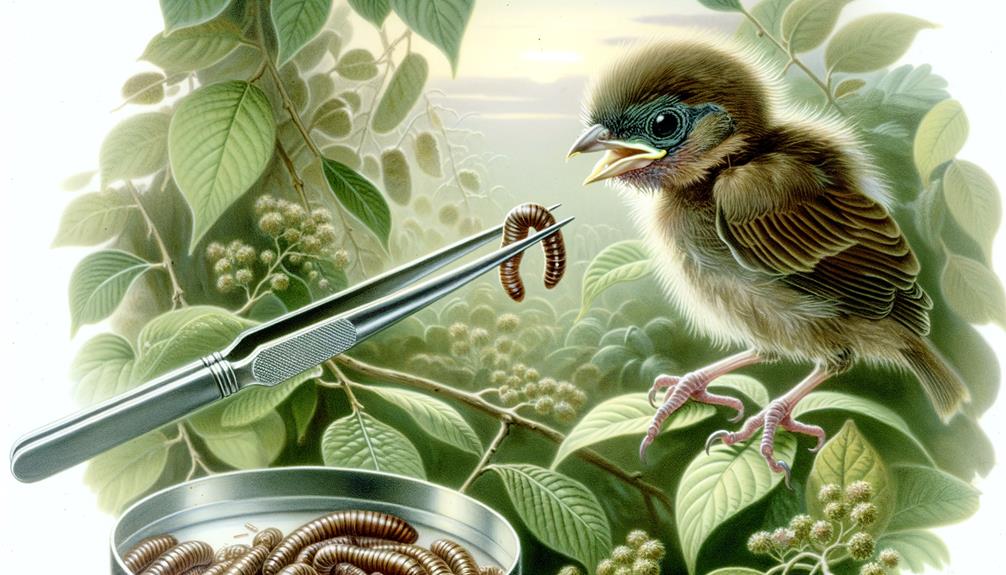
Regularly evaluating the fledgling sparrow's weight, feather condition, and activity levels is crucial for monitoring its overall health and development. These parameters offer essential insights into the bird's nutritional status and well-being.
A systematic approach involves:
- Weight Measurement: Use a precise digital scale to track weight changes, ensuring the bird is gaining mass, which reflects adequate nutrition.
- Feather Condition Analysis: Examine feathers for signs of growth and health, such as uniformity and sheen, which indicate proper protein intake and overall vigor.
- Activity Level Observation: Monitor the sparrow's behavior and energy levels, noting any decline in activity that could signal underlying health issues, potentially related to diet or environmental stressors.
This analytical monitoring helps in timely identifying and mitigating potential health concerns.
Expert Tips for Care
To secure the fledgling sparrow thrives, experts recommend a carefully balanced diet supplemented with mealworms, which provide essential proteins and nutrients necessary for peak growth and development. Feeding should be frequent, approximately every 20-30 minutes during daylight hours, to mimic the natural feeding patterns observed in wild sparrows.
The mealworms should be chopped into manageable pieces to prevent choking hazards. Additionally, incorporating a variety of soft, insect-rich foods can enhance nutritional diversity. Hydration is critical; ultimately, a constant supply of clean water.
Monitor the fledgling's weight and plumage condition regularly, as these are indicators of health and proper nutrition. Lastly, avoid over-reliance on mealworms alone; a mixed diet is key to fostering a robust, healthy sparrow.
Conclusion
To sum up, the dietary regimen for fledgling sparrows must be carefully curated to promote peak health and development.
While mealworms can serve as a beneficial supplement, providing essential proteins and fats, over-dependence may lead to nutritional imbalances.
The thoughtful inclusion of diverse food sources is akin to painting a vivid mosaic, guaranteeing all nutritional needs are fulfilled.
Ongoing monitoring and adjustment of the diet, guided by expert recommendations, are crucial for the well-being of these young avians.

